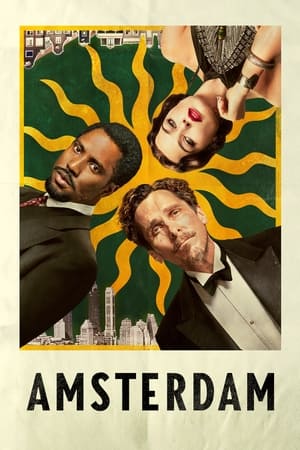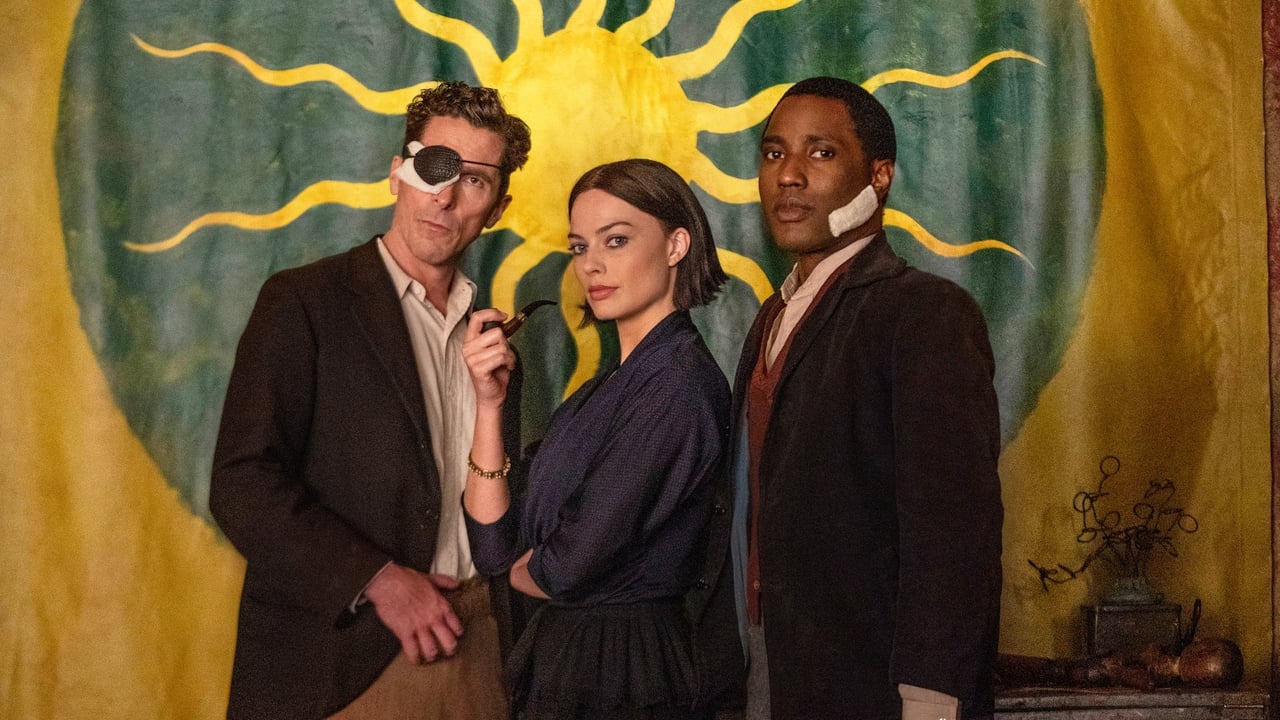
Hollywood has been battling nightmarish politics with goofy antics for just about as long as cinema has existed. Hell, even the Third Reich inspired its share of comedy classics—not merely decades later (as in, say, The Producers’ deliberately ludicrous “Springtime for Hitler” production number), but while World War II was still very much in progress. Charlie Chaplin ridiculed Hitler in 1940’s The Great Dictator, before the United States had even entered the war; a couple of years later, Jack Benny got big laughs infiltrating and impersonating ruthless Nazi officers in Ernst Lubitsch’s remarkably daring To Be or Not to Be. It’s quite a tricky balancing act to pull off, admittedly, but I wanted to note for the record that it’s been done successfully before, under daunting conditions, before complaining at length about Amsterdam, which whiffs the combination of ominous and hilarious so badly that it’s hard to be sure what the hell writer-director David O. Russell thought he was doing. And I say that as someone who often thoroughly enjoys it when David O. Russell doesn’t necessarily have the firmest of grips on his movie’s intentions.
Amsterdam is the first feature that Russell has made since…let’s phrase it as “since Obama left office,” though “since America jumped the shark” would serve equally well. (His previous effort was 2015’s Joy, which inspired relatively little of same.) In any case, he’s clearly concerned, as well he and we all should be, by the Republican Party’s growing flirtation with neo-fascism, and has reached back to a largely forgotten but broadly similar historical incident: the so-called “Business Plot,” which allegedly saw a group of U.S. tycoons try to get Franklin D. Roosevelt out of the White House just a year into his first term. I threw in “allegedly” there because historians still disagree about whether this nefarious scheme amounted to more than idle if loathsome chatter—it might have been 1933’s equivalent of people on Truth Social insisting that Trump is still actually president. What’s certain, though, is that a retired Marine, Major General Smedley Butler, testified under oath to Congress that he’d been approached by fat cats who were seeking to engineer a coup d’état and install him as a business-friendly dictator. Smedley’s counterpart in Amsterdam, General Gil Dillenbeck, is played by Robert De Niro, and Russell includes footage during the closing credits showing De Niro side-by-side with Butler, both men delivering the same testimony in unison. This really happened!
Thing is, that’s pretty much the only thing in Amsterdam that really happened, and De Niro plays but a small supporting role (as he generally does in Russell’s recent films; I suppose Silver Linings Playbook qualifies as a large supporting role). Now, that’s not inherently a problem, by any means—if anything, movies based on historical events tend to fare better the more they diverge from strict accuracy, since real life tends to be, from a dramatic standpoint, both shapeless and unsatisfying. And there was certainly potential in the story framework that Russell invented, involving three World War I vets—badly wounded soldiers Burt Berendsen (Christian Bale, in his third collaboration with Russell) and Harold Woodman (John David Washington), plus nurse Valerie Voze (Margot Robbie)—whose once-fast friendship gets rekindled as they investigate a murder that gradually leads them to a lightly fictionalized version of the Business Plot. That Berendsen and Woodman are also suspected of committing said murder complicates matters considerably, as does the fact that Valerie has spent the past dozen or so years as a functional invalid, rarely leaving her family’s ritzy estate due to some sort of vaguely defined malady requiring very heavy medication.
If that last detail seems difficult to square with zaniness, well, there’s Amsterdam’s problem in a nutshell: It’s almost never clear what kind of movie this is supposed to be. Certainly, Bale believes himself to be starring in a fairly broad comedy—Berendson’s combat injuries left him with one glass eye, as well as other facial deformities, and while that could serve as a constant grim reminder of war’s human cost, Bale instead leans into the artificiality, mugging up a storm with both his expressions and his New York accent (which actually makes him sound a bit like De Niro at times). Washington, on the other hand, never does anything that could even remotely be construed as humorous. This contrast is exceedingly odd, since the two are frequently standing right beside each other; the effect is less prankster and straight man than it is one actor who thinks he’s still making The Big Short and one actor who thinks he’s still making Tenet. Russell’s pacing and Daniel Pemberton’s score, both of which could fairly be described as antic, side with Bale. The film’s entire third act, which I’ll address momentarily, thinks Washington’s got it all figured out. And Robbie’s stuck in the middle, playing a character who vacillates between brassy and pitiable, often in the same scene.
That flailing sensation eventually permeates every aspect of Amsterdam, including its large and just ridiculously impressive supporting cast. Mike Myers shows up early on as a British spy, in a performance not unlike his Inglourious Basterds cameo, and has a grand old time (alongside Michael Shannon as an American spy); each time he reappears, however, he’s given fewer opportunities to be funny, and by the finale he’s become human furniture. Matthias Schoenaerts and Alessandro Nivola never quite figure out what to do as the cops investigating our heroes—one genuinely thinks them guilty, the other harbors doubts and is willing to give them some rope, and…that’s it, basically. The movie has nothing cogent to say about its period’s racism, but nonetheless has Chris Rock, who cannot divest himself of a modern sensibility, toss out a few slightly anachronistic-sounding barbs. Faring best are Rami Malek and Anya Taylor-Joy, as Valerie’s brother and sister-in-law; both of them telegraph their characters’ nefarious intentions, but this ought to have been the sort of movie in which the emphatic is an asset, not a liability. (Oh, there’s also Timothy Olyphant, whose role is tiny but who gets bonus points for being made up to be unrecognizably ugly.)
It's an unstable structure, however, that ultimately sees Amsterdam fully collapse. After opening in 1933 and setting the present-tense intrigue in motion—if you don’t yet know which mega-star gets squashed beneath an automobile’s tires almost as soon as she appears, I’ll let that be a pleasant surprise—the film flashes back to World War I and its aftermath, showing how the central trio first met and chronicling their short-lived idyll in the title city (which thus functions here as a lost Shangri-La; not for nothing does the bulk of the movie take place in New York, formerly New Amsterdam). This expository reverie goes on for so long that it kills all momentum before Russell’s even really managed to generate any. Still, it’s far preferable to Amsterdam’s interminable climax, which laboriously underlines parallels between the Business Plot and current anti-democratic (and pro-Republican) machinations. The analogy was absolutely worth making, but a little faith in our ability to connect the dots on our own would have been nice. In general, Russell seems anxious here: anxious about America’s future, to be sure; but also anxious that we won’t grasp what he’s up to; anxious that humor won’t land unless it’s constantly signaled; anxious that too much humor risks making very serious matters come across as overly frivolous. He tries to do everything at once, and winds up accomplishing precious little.
One of the first notable online film critics, having launched his site The Man Who Viewed Too Much in 1995, Mike D’Angelo has also written professionally for Entertainment Weekly, Time Out New York, The Village Voice, Esquire, Las Vegas Weekly, and The A.V. Club, among other publications. He’s been a member of the New York Film Critics Circle and currently blathers opinions almost daily on Patreon.






